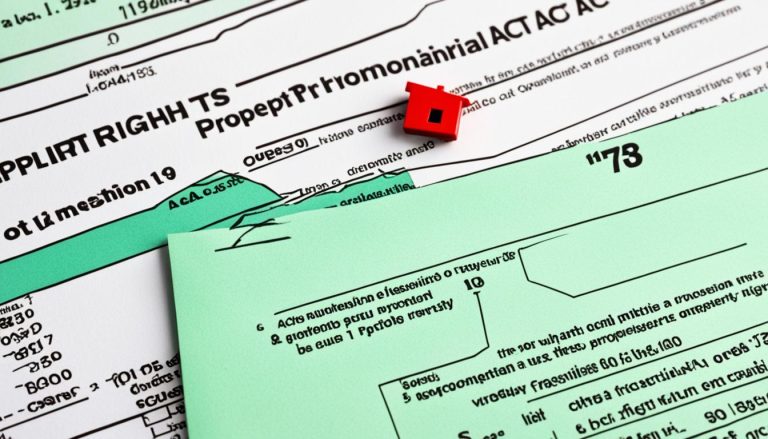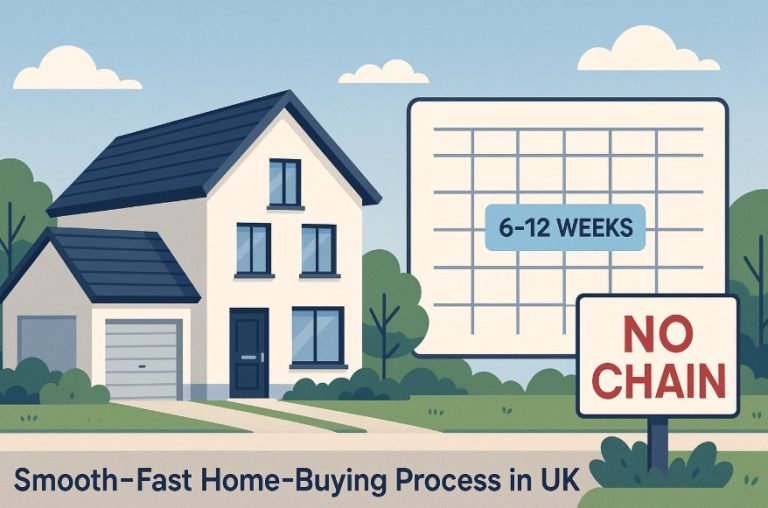Selling a house quickly in the UK can be a challenging task, particularly in a fluctuating market.
Whether driven by financial urgency, relocation, or property issues, homeowners often need faster alternatives to traditional estate agent sales.
This guide explores the quickest way to sell a house, examining fast-sale options such as cash buyers and quick sale firms, while highlighting the benefits, risks, and legal considerations. Understanding your options is key to achieving a smooth, efficient, and informed sale.
What Is The Quickest Way To Sell A House In The UK Today?
Selling a house in the UK can be a lengthy and often unpredictable process, particularly when using traditional estate agents.
On average, it takes around 18 to 24 weeks to complete a property sale from listing to final exchange of contracts.
This includes time for marketing the property, receiving and negotiating offers, mortgage approvals, surveys, conveyancing, and sometimes resolving issues in a property chain.
For many homeowners, especially those facing time-sensitive situations, such a timeline simply isn’t viable.
So, what is the quickest way to sell a house in the UK?
The speed of a house sale depends on several factors, including the method chosen, market conditions, location, and property type. Below are the fastest options available:
1. Selling to a Quick House Sale Company

Arguably the fastest method is selling to a cash-buying company that specialises in rapid property transactions.
These companies claim to complete purchases in as little as 7 to 14 days. Because they don’t rely on mortgage finance and often buy properties directly, there are fewer delays. The trade-off is that they typically offer 75% to 85% of your home’s market value.
This method is best suited for:
- Sellers facing repossession
- Owners of inherited or vacant properties
- Homeowners needing to relocate quickly
- Properties that are hard to sell through estate agents due to structural or legal issues
2. Selling at Property Auction

Auctions can also offer a fast sale. Once the hammer falls, the winning bidder pays a deposit and is legally bound to complete the purchase, usually within 28 days.
While this route gives certainty and speed, the final sale price is not guaranteed and may be lower than expected unless there is strong interest in the property.
Auctions are especially useful for:
- Properties needing renovation
- Unusual homes not suited to traditional buyers
- Sellers looking for a legally binding sale with a set timeline
3. Part Exchange With A Housebuilder

Some property developers offer part exchange schemes, where they agree to buy your existing home as part of the purchase of a new-build property.
This allows you to avoid estate agent fees and chain-related delays. The process can be completed relatively quickly often within a few weeks but the offer you receive may be slightly below market value.
This is ideal for:
- Homeowners upgrading to a new-build home
- Sellers looking for a hassle-free transaction
4. Using Multiple Estate Agents (Joint Or Multi-Agency Agreement)

Working with multiple estate agents can significantly increase your property’s exposure, thereby improving the chances of a quicker sale.
Agents compete to sell the property first, and this sense of urgency can help move things along. However, multi-agency agreements may involve higher commission fees, typically around 2.5% to 3.5%.
This option works well when:
- You need maximum market reach
- Your property has broad appeal in a competitive location
5. Private Sale Or Off-Market Deals

Private sales, especially to people already known to the seller (family, friends, or local investors), can be arranged quickly and with fewer formalities. While this can be one of the fastest options, it requires mutual trust, legal due diligence, and strong communication to avoid misunderstandings or disputes.
Speed Comparison Table
Here is a comparison of the average completion times for each sale method:
| Method | Average Time to Complete | Typical Price Achieved |
| Quick House Sale Company | 7–28 days | 75% – 85% of market value |
| Property Auction | 28 days after auction | 80% – 90% of market value |
| Part Exchange with Developer | 2–6 weeks | 85% – 90% of market value |
| Traditional Estate Agent | 12–24 weeks | 95% – 100% of market value |
| Private Sale (Off-market) | 2–8 weeks | Varies (Negotiable) |
Factors That Influence Sale Speed
Regardless of the method chosen, the following factors also affect how quickly a property sells:
- Location: Properties in high-demand areas such as London, Manchester, or Birmingham sell faster than rural or remote homes.
- Condition: Well-maintained homes are more attractive and reduce the chance of price renegotiation after a survey.
- Pricing Strategy: Competitive pricing based on accurate valuation attracts more interest and faster offers.
- Legal Preparedness: Having documents such as the title deed, Energy Performance Certificate (EPC), and planning permissions ready can streamline the conveyancing process.
How Do Quick House Sale Companies Work?
Quick sale companies are designed to expedite the home selling process by either purchasing the home directly or connecting the seller to a network of pre-approved cash buyers.
These companies often promise to complete transactions within 7 to 28 days, bypassing the lengthy mortgage approval process common in traditional sales.
There are generally two types of quick sale firms:
- Direct Buyers: These companies use their own capital to buy properties.
- Broker Firms: These connect sellers with third-party buyers for a fee or commission.
Unlike estate agents, these firms typically offer to cover additional costs such as legal fees and surveys, making the process appear simple and fast. However, the speed is often achieved by offering below-market prices, making them more suitable for urgent sales rather than maximising profit.
Why Might Homeowners Choose To Sell Quickly?
There are numerous reasons why homeowners in the UK may need a quick sale. Some of the most common include:
- Financial Pressure: Homeowners facing repossession or overwhelming debt may prefer the speed of a cash buyer.
- Inheritance: Beneficiaries may inherit a property they do not wish to keep and want to sell quickly.
- Divorce Or Separation: Relationship breakdowns often lead to the need to dispose of shared property swiftly.
- Health Concerns Or Downsizing: Ageing homeowners may need to move into care homes or more accessible housing.
- Job Relocation: A new role in a different part of the country or abroad may necessitate a quick move.
- Hard-To-Sell Properties: Properties with issues such as short leases or structural problems may not fare well on the open market.
In these cases, convenience and certainty often take precedence over obtaining the highest sale price.
What Are The Risks Of Using Quick Sale Property Firms?

While quick sale firms offer speed and simplicity, sellers should be aware of the risks involved.
These companies operate in a largely unregulated market, which means standards can vary significantly.
Key risks include:
- Receiving a final offer significantly below initial estimates
- Lack of transparency in fee structures
- Price reductions were made late in the process after surveys
- Contract terms that tie in sellers or impose penalties for withdrawal
- Delays that contradict the promised completion timeline
Sellers should thoroughly review contracts and seek independent legal advice before signing with any quick sale provider.
How Much Below Market Value Do Cash House Buyers Usually Offer?
Cash buyers typically offer a reduced price to account for the speed, convenience, and risk they assume. On average, sellers can expect to receive around 75% to 85% of the property’s full market value.
Here is a comparison of sale values:
| Type of Sale | Average Sale Price Achieved |
| Traditional Estate Agent | 95% – 100% of market value |
| Quick Sale Company | 75% – 85% of market value |
| Property Auction | 80% – 90% of market value |
| Part Exchange with Developer | 85% – 90% of market value |
Although a lower offer may seem unattractive at first glance, sellers can benefit from faster transactions, no estate agent fees, and fewer disruptions.
How Can You Protect Yourself When Using A Fast House Sale Service?
Given the lack of formal regulation, protecting yourself is crucial when dealing with a quick house sale company. Following a few structured steps can greatly reduce your risk:
- Obtain independent valuations from at least three local estate agents to establish an accurate market value
- Research potential buyers thoroughly through independent review platforms
- Ensure the company is a registered member of the National Association of Property Buyers (NAPB) or The Property Ombudsman (TPO)
- Hire an independent solicitor not affiliated with the buying company
- Request all details, including fees, terms, and offers, in writing
- Avoid verbal agreements or pressure tactics
- Refuse contracts with long tie-in periods or unclear exit clauses
Taking a proactive approach ensures sellers are informed, protected, and in control of the transaction.
Are There Trusted And Regulated Quick Sale Firms In The UK?
While the quick sale sector is not regulated by a government body, there are reputable firms that choose to abide by voluntary codes of conduct. Membership in professional bodies can serve as an indicator of a company’s commitment to fair treatment.
Organisations to look for:
- The National Association of Property Buyers (NAPB): Members are required to adhere to ethical practices and must also be registered with The Property Ombudsman.
- The Property Ombudsman (TPO): Offers a complaint resolution process and the potential for financial compensation if the firm breaches its code.
These bodies can award compensation, though the amounts are generally modest. For example, the average compensation in 2021 for successful complaints was approximately £580, with a maximum cap of £25,000.
What Alternatives Exist To Selling Through A Quick House Sale Firm?

Sellers should consider all available options before committing to a quick sale firm. In some situations, alternative methods may achieve a faster sale while retaining more of the property’s value.
| Sale Method | Pros | Cons |
| Estate Agent | Higher sale price, professional support | Longer sale time, potential fall-through |
| Online Estate Agent | Lower fees, wider exposure | Less personalised service |
| Auction | Legally binding, quick turnaround | Risk of low bids |
| Private Sale | No commission fees | Requires negotiation skills |
| Part Exchange | Convenient if buying a new build | Lower value, limited availability |
Each route comes with its own level of risk, cost, and complexity. For many, an open-market sale via multiple agents provides a good balance of speed and price.
Can You Sell Your House Fast And Still Get Full Market Value?
While rare, some sellers do manage to achieve a fast sale at or near full market value. Success largely depends on property presentation, local demand, and pricing strategy.
To increase the chances of a fast, full-value sale:
- Price your property realistically, based on valuations
- Stage the home to increase visual appeal
- Enhance kerb appeal with tidy gardens and well-maintained exteriors
- Use professional photography for online listings
- Offer flexible viewing times, including evenings and weekends
- Instruct multiple estate agents under a competitive agreement
Effective marketing and strong initial pricing can result in higher buyer interest and quicker offers without the need to accept a reduced price.
What Questions Should You Ask A Quick House Sale Company?
Asking the right questions can reveal a lot about a company’s credibility and intentions. A reliable firm should be transparent about their process and pricing.
Key questions include:
- Who will actually be purchasing the property?
- Is the sale conditional upon a survey or other checks?
- Can you guarantee the completion date?
- What are all the fees involved, including hidden costs?
- Are you a member of NAPB or TPO?
- Will I have a chance to review the survey report?
- Can I withdraw from the agreement at any time?
These questions help uncover potential red flags and ensure the seller is fully informed before proceeding.
How Do I Lodge A Complaint If Something Goes Wrong With A Quick House Sale?

If a seller believes they have been misled or treated unfairly during a quick sale process, the complaint process depends on the company’s membership status with regulatory bodies.
Steps to follow:
- Submit a written complaint directly to the company, allowing them the opportunity to respond
- If unresolved and the company is a member of TPO or NAPB, escalate the matter through the official complaints process
- Provide documentation such as contracts, emails, and valuation reports to support your claim
- If necessary, pursue legal action through small claims court or seek advice from a solicitor
While compensation awards are available via the Ombudsman, they are limited, and not all firms are affiliated with any redress scheme.
Conclusion
The quickest way to sell a house in the UK depends on your personal circumstances, financial goals, and risk tolerance. Quick house sale companies offer speed but come at a cost, while traditional routes often yield higher returns but take more time.
For homeowners needing immediate resolution, regulated quick sale firms may be a viable option provided proper due diligence is done.
Ultimately, understanding all the available options and asking the right questions is essential to making an informed, financially sound decision.
Frequently Asked Questions
Is it legal to sell your house below market value in the UK?
Yes, selling below market value is legal. However, it’s crucial to understand the implications, especially if transferring the property to a family member, as it may impact tax liabilities.
How fast can a cash house sale complete?
Cash house sales can typically complete in 7 to 28 days, depending on legal checks, survey outcomes, and the responsiveness of both parties.
Are online valuation tools accurate for quick sales?
Online tools provide estimates, but they often lack local market context. Always supplement online valuations with in-person estate agent assessments.
What is the average time to sell a house through an estate agent in the UK?
On average, it takes between 12 and 24 weeks to sell a home through an estate agent, factoring in marketing, viewings, offers, and conveyancing.
Do I have to pay tax on a quick house sale?
Capital Gains Tax may apply if the property isn’t your main residence. Always consult a tax advisor before proceeding.
Can I sell my house if I’m in mortgage arrears?
Yes, but it’s advisable to contact your lender first. They may offer solutions like mortgage holidays or term extensions before you consider selling.
Is using a property auction a good alternative to a quick sale firm?
Yes, auctions can lead to fast sales with legal commitment once the hammer falls. However, achieving market value depends on buyer interest and pricing strategy.






